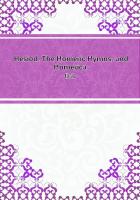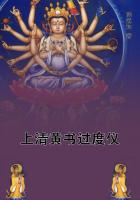Monsieur de Maulincour took refuge, as we have said, with a whole family of fugitives, under the porch of an old house, the court-yard of which looked like the flue of a chimney. The sides of its plastered, nitrified, and mouldy walls were so covered with pipes and conduits from all the many floors of its four elevations, that it might have been said to resemble at that moment the /cascatelles/ of Saint-Cloud. Water flowed everywhere; it boiled, it leaped, it murmured; it was black, white, blue, and green; it shrieked, it bubbled under the broom of the portress, a toothless old woman used to storms, who seemed to bless them as she swept into the street a mass of scraps an intelligent inventory of which would have revealed the lives and habits of every dweller in the house,--bits of printed cottons, tea-leaves, artificial flower-petals faded and worthless, vegetable parings, papers, scraps of metal. At every sweep of her broom the old woman bared the soul of the gutter, that black fissure on which a porter's mind is ever bent. The poor lover examined this scene, like a thousand others which our heaving Paris presents daily; but he examined it mechanically, as a man absorbed in thought, when, happening to look up, he found himself all but nose to nose with a man who had just entered the gateway.
In appearance this man was a beggar, but not the Parisian beggar,--that creation without a name in human language; no, this man formed another type, while presenting on the outside all the ideas suggested by the word "beggar." He was not marked by those original Parisian characteristics which strike us so forcibly in the paupers whom Charlet was fond of representing, with his rare luck in observation,--coarse faces reeking of mud, hoarse voices, reddened and bulbous noses, mouths devoid of teeth but menacing; humble yet terrible beings, in whom a profound intelligence shining in their eyes seems like a contradiction. Some of these bold vagabonds have blotched, cracked, veiny skins; their foreheads are covered with wrinkles, their hair scanty and dirty, like a wig thrown on a dust-heap. All are gay in their degradation, and degraded in their joys; all are marked with the stamp of debauchery, casting their silence as a reproach; their very attitude revealing fearful thoughts. Placed between crime and beggary they have no compunctions, and circle prudently around the scaffold without mounting it, innocent in the midst of crime, and vicious in their innocence. They often cause a laugh, but they always cause reflection. One represents to you civilization stunted, repressed; he comprehends everything, the honor of the galleys, patriotism, virtue, the malice of a vulgar crime, or the fine astuteness of elegant wickedness. Another is resigned, a perfect mimer, but stupid. All have slight yearnings after order and work, but they are pushed back into their mire by society, which makes no inquiry as to what there may be of great men, poets, intrepid souls, and splendid organizations among these vagrants, these gypsies of Paris; a people eminently good and eminently evil--like all the masses who suffer--accustomed to endure unspeakable woes, and whom a fatal power holds ever down to the level of the mire. They all have a dream, a hope, a happiness,--cards, lottery, or wine.
There was nothing of all this in the personage who now leaned carelessly against the wall in front of Monsieur de Maulincour, like some fantastic idea drawn by an artist on the back of a canvas the front of which is turned to the wall. This tall, spare man, whose leaden visage expressed some deep but chilling thought, dried up all pity in the hearts of those who looked at him by the scowling look and the sarcastic attitude which announced an intention of treating every man as an equal. His face was of a dirty white, and his wrinkled skull, denuded of hair, bore a vague resemblance to a block of granite. A few gray locks on either side of his head fell straight to the collar of his greasy coat, which was buttoned to the chin. He resembled both Voltaire and Don Quixote; he was, apparently, scoffing but melancholy, full of disdain and philosophy, but half-crazy. He seemed to have no shirt. His beard was long. A rusty black cravat, much worn and ragged, exposed a protuberant neck deeply furrowed, with veins as thick as cords. A large brown circle like a bruise was strongly marked beneath his eyes, He seemed to be at least sixty years old. His hands were white and clean. His boots were trodden down at the heels, and full of holes. A pair of blue trousers, mended in various places, were covered with a species of fluff which made them offensive to the eye. Whether it was that his damp clothes exhaled a fetid odor, or that he had in his normal condition the "poor smell" which belongs to Parisian tenements, just as offices, sacristies, and hospitals have their own peculiar and rancid fetidness, of which no words can give the least idea, or whether some other reason affected them, those in the vicinity of this man immediately moved away and left him alone. He cast upon them and also upon the officer a calm, expressionless look, the celebrated look of Monsieur de Talleyrand, a dull, wan glance, without warmth, a species of impenetrable veil, beneath which a strong soul hides profound emotions and close estimation of men and things and events. Not a fold of his face quivered. His mouth and forehead were impassible; but his eyes moved and lowered themselves with a noble, almost tragic slowness. There was, in fact, a whole drama in the motion of those withered eyelids.















